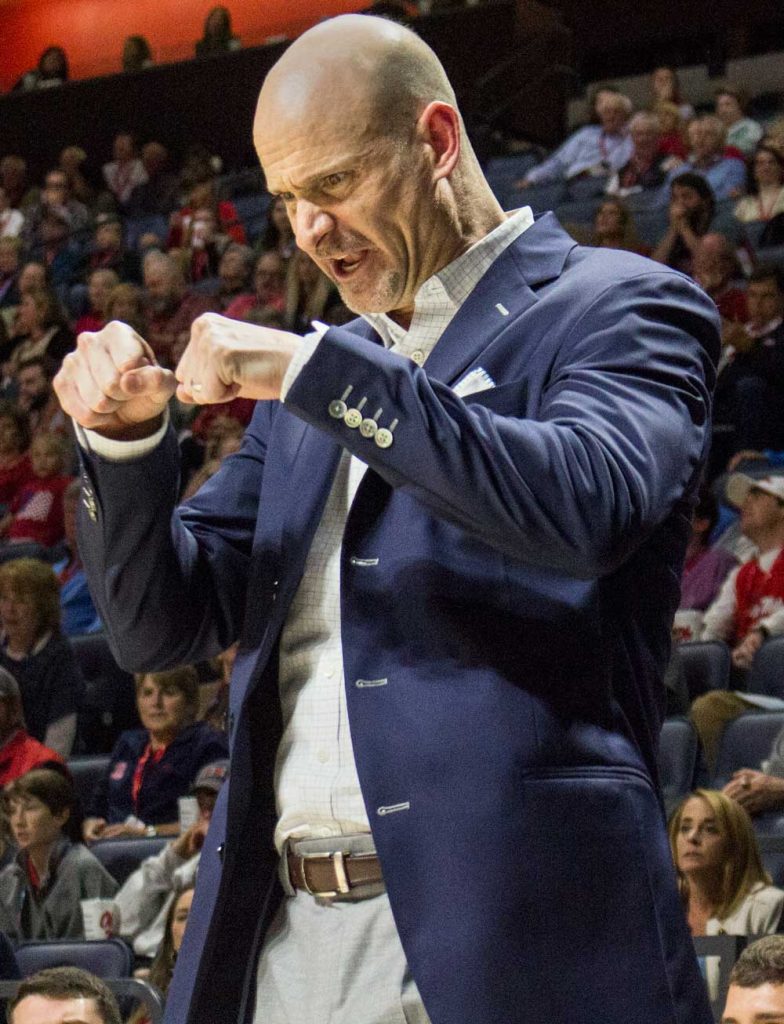As Andy Kennedy nears the end of his 13th year as head coach of Ole Miss men’s basketball, the program continues to struggle. Important victories, including a barn-burner over Florida earlier this month, are few and far between and have been overshadowed by loss after loss. The Rebels, currently 10-9 overall and 3-4 in conference play, seem unable to put the pieces together.
They have the talent – especially in the back court – but can’t find a rhythm. Kennedy returned 2016-17 leading scorer Terence Davis; sophomore Breein Tyree, one of the nation’s top high school point guards in 2015; and DeAndre Burnett, a mercurial combo guard who transferred from Miami three years ago and has demonstrated an ability to drive and score at will. Add to that corp freshman Devontae Shuler, whom Steve Smith (head coach at Oak Hill Academy, which is known for producing such players as Kevin Durant and Carmelo Anthony) once called the “best on-the-ball defender” he’d ever seen, and it’s easy to see why fans expected greatness this year.
But the Ole Miss basketball program has been anything but great.

Head coach Andy Kennedy instructs his players late in the game against the University of Louisiana at Lafayette. The Rebels beat the Ragin’ Cajuns 94-76 in the Friday night opener. Photo by Billy Schuerman.
Its 78.8 points per game ranks 75th among NCAA Division I programs, but its defense has been even worse. The Rebels are conceding an average of 75.9 points per game, which is worse than 268 other Division I basketball teams. And those points will count come selection time in March. The Rebels have lost five games by six or fewer points this season.
Consider Saturday’s 97-93 loss to Arkansas, an unranked SEC opponent with a losing conference record. The Rebels went down early, and the Razorbacks fought off a late comeback attempt to seal the victory. What went wrong for the Rebels?
Well, a lot. But first and foremost, the Rebels are failing to consistently connect from three. Without a low-post threat (sorry, but Bruce Stevens is still too big of a defensive liability to build a team around), the Rebels are forced to rely on their guards, and in today’s version of the game, teams live and die by the 3-point shot. Top-level coaches understand the shot’s statistical advantage and abuse it, and mid-range shots are a thing of the past. Even the Toronto Raptors’ DeMar DeRozan, perhaps the greatest mid-range shooter in the NBA, has been leaning more toward 3-point shots this year.
This trend has left Kennedy’s teams in the dust, and this year is no exception. On Saturday, the Rebels shot a decent, but not great, 37.9 percent from behind the arc, making 11 of their 29 attempts. However, those numbers were padded by back-to-back Burnett threes near the end of the game. Arkansas, on the other hand, drained 11 threes of its own on just 22 attempts.
Efficiency is key, and the Rebels are anything but efficient.
In fact, Ole Miss ranks 267th nationally in 3-point field goal percentage on the season, making 161 of its 486 attempts thus far (33.1 percent). But what’s fascinating is the Rebels’ obsession with the shot. Their 486 attempts rank 71st in the country, oddly high for a team toothless from three. Teams can be successful while shooting this low of a 3-point percentage. Just look to 14-5 Middle Tennessee, a 2017 NCAA Tournament team that beat Ole Miss earlier this season and shoots 33.2 percent from three. The Blue Raiders have an identity; they run the court and rely on their size to stretch defenses, and it masks their ineffectiveness from downtown. Kennedy’s team, on the other hand, lacks an identity, and its over-reliance on deep, low-percentage attempts confirms it.
Davis and Burnett are taking the lion’s share of Ole Miss’ 3-point attempts this season (211 of 486), and the two are averaging a combined 36 percent from behind the arc. Shuler, who has taken the third-most threes on the team, has drained just 22 of his 82 attempts this year. Averaged together, the Rebels’ three “sharpest shooters” shot 33.4 percent from 3-point land.
Not good enough for a team on the brink of SEC relevance.
Without a legitimate threat from the arc, opponents are free to sit in and let the Rebels attempt to attack the paint. Burnett and Tyree take turns putting their heads down and driving to the lane, hoping to score or pick up a foul, at least. That’s no way to run an offense. The Rebel attack looks stagnant and unimaginative on the floor, and the team lacks an attacking ethos.
Ultimately, that’s on Kennedy, whose contract was not extended in May of last year. He is running out of time to save his job. From the perspective of an Ole Miss basketball fan, that might be a good thing.






